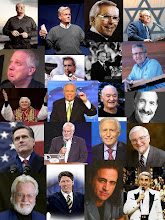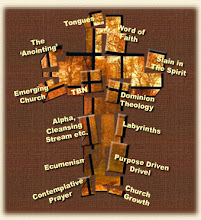 |
| Billy Graham posing with the Illuminati hand sign, the Devil's Claw. |
Billy Graham is one of the most beloved and respected evangelists of the 20th century. He is also one of the most compromised Christians of our time. His involvement in the ecumenical movement is well documented, he's a 33rd degree Freemason, and he has several questionable friendships in high, crooked places. He has publicly endorsed the National Council of Churches and the World Council of Churches, both known Communist fronts working toward the one world religion.[1] He has embraced Universalism unashamedly in his old age.
Over 30 years ago, as Graham started preaching internationally, he united all evangelicals in the task of evangelizing the world. One of the most influential documents in modern Evangelical Christianity is the Lausanne Covenant, and was written and adopted by 2,300 evangelicals at the International Congress on World Evangelization in Lausanne, Switzerland.
The covenant is a Christian religious manifesto promoting world-wide Christian evangelism. The first Lausanne conference, held in 1974, brought together 2,700 Christian religious leaders from over 150 countries and was called by a committee headed by Graham.
This video describes Graham's leadership in the Lausanne Covenant and Conference.
(YouTube link)
The National Association of Evangelicals (NAE) is a supporter of the Lausanne Covenant. The goals of the Lausanne Covenant reflect the concerns of the "U.N. Millennium Development Goals." [2] If a denominational headquarters is a member of the NAE, then it is advancing the goals of World Socialism and the final world government.
The following are current denominational members of the NAE:
Advent Christian General Conference
Anglican Mission in America
Assemblies of God
Brethren in Christ Church
Christian Reformed Church in North America
Christian Union
Church of God (Cleveland, Tenn.)
Church of the Nazarene
Conservative Congregational Christian Conference
Converge Worldwide
Elim Fellowship
Evangelical Assembly of Presbyterian Churches
Evangelical Congregational Church
Evangelical Friends Church International
Evangelical Presbyterian Church
Evangelical Free Church of America
Every Nation Churches
Fellowship of Evangelical Churches
Free Methodist Church of North America
General Association of General Baptist
Grace Communion International
Great Commission Churches
International Church of the Foursquare Gospel
International Pentecostal Church of Christ
International Pentecostal Holiness Church
Missionary Church, Inc.
North American Baptist Conference
Open Bible Churches
Presbyterian Church in America
Primitive Methodist Church USA
The Brethren Church
The Christian and Missionary Alliance
The Evangelical Church
The Salvation Army
The Vineyard, USA
The Wesleyan Church Corporation
Transformation Ministries
United Brethren in Christ
US Conference of the Mennonite Brethren Churches
This leads me to believe that the National Association of Evangelicals have long supported ecumenism and their goal of unity. As you read in the last post, Leith Anderson, President of the NAE, has been appointed to the Presidents new faith council. It is important to note that Anderson signed the Manhattan Declaration, recognized as an ecumenical document/pact between leaders of socially liberal denominations.[3]
Anderson didn't think to stop there. He also signed the interfaith document "A Common Word Between Us and You" in 2007. This document opened interfaith dialogue between Christians and Muslims. Among the organizations backing the dialogue were the World Council of Churches (WCC), and the World Islamic Call Society (WICS), a network with about 600 affiliated Muslim bodies. It calls for peace between Muslims and Christians and tries to work for common ground and understanding among both faiths, in line with the Qur'anic commandment to "Say: "O People of the Scripture! Come to a common word as between us and you: that we worship none but Allah" and the Biblical commandment to love God, and one’s neighbour. [4]
I realize that many of the local churches do not adhere to what is taking place within their national denominational headquarters. The problem is that the financing of the denominational headquarters is funded by the local churches. The local church keeps the monster breathing. I regret to say that it will eventually gain strength and trickle down to the local level. This is a difficult time for the informed to live in.










